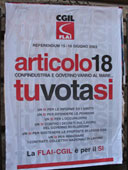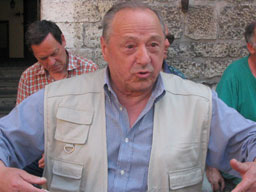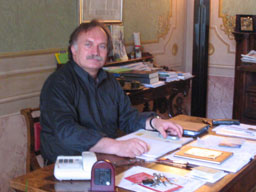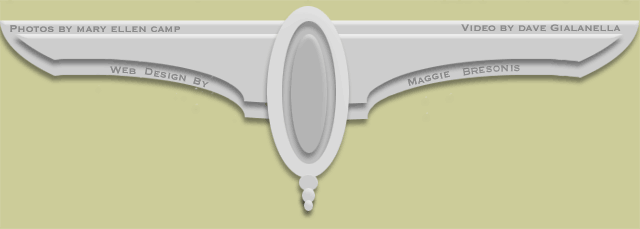


Posters for the referendum hung all over Cagli


Sauro is one of the many who likes to discuss politics.
 Cagli's Mayor, in his City Hall office.
Cagli's Mayor, in his City Hall office.
 |
||||
 |
The indomitable wall sitters of Cagli are late arriving to their perches today. Having shied away from the unusually warm June temperatures, half a dozen older men are now returning as the shadows cool their seats. Days before yet another referendum is scheduled to occur in Italy, politics is once again the topic of conversation on the wall. 'We would talk about women, but we're too old for that now,' says Sauro, dressed elegantly as always despite the heat. |  Posters for the referendum hung all over Cagli |
 |
|
| Glad to find a willing listener, Sauro explains to me at length his frustration with Cagli's "sindaco," or mayor, who he says is doing little to prevent this small city's hospital from shutting down.Political discussions like these are not uncommon in Cagli, and are not limited to the city's most seasoned observers. According to the BBC, Italy's voter participation rate is the highest of any European country, and Cagli is nestled in one of the nation's most politically active regions. "This is a small area, but it has always had an important political role," says Peppino Tarsi, the local leader for Italy's largest labor union. He adds that this has not changed for 2000 years, dating back to when Cagli served as an important stop on the Flaminian Road, the major route Roman soldiers used when traveling from the capital to the Adriatic Sea.That road, of course, predates Italy's current political structure. Scarred by the devastation caused by World War II, Italians voted in 1946 to adopt a Republican form of government. They were wary of giving too much power to one man or party, and | ||||
 Sauro is one of the many who likes to discuss politics. |
the country's 1948 constitution created a government structured to give all factions a voice. Today, there are over three dozen political parties represented in Italy's parliament, with most of the major parties operating locally in offices scattered throughout Cagli. | |||
| But as any Cagliese will tell you, that structure is beginning to evolve into one more like America's, with one center-left and one center-right voting faction. Cagli is historically a stronghold of the center-left.Outside of a few brief anomalies, the left has been firmly in power in the region, which means the locals are strongly opposed to the current right-wing administration of Prime Minister Silvio Berlusconi.Italy's communist party is especially strong in the region, and a local monument honors those communists who fought against the fascists in World War II. Tarsi is quick to point out that in Italy, communism and democracy are one and the same, however. "No opinion can change this truth," he says.Despite the growing trend of unification through the European Union, the Cagliese pay little attention to global affairs says Enzo, a bartender at Caffe D'Italia who is often drawn into the debates of his patrons. (Of course, the bartender cannot take a stance, only listen, he says.) Whether the subject is the hospital or parking, talking politics is a passion of the Cagliese. | ||||
| It is no surprise, then, that both the mayor (who in Italy need not live in the town he or she governs) and the regional president are from Cagli. Indeed, all politics is local here, and no one knows this better than the "sindaco" Domenico Papi. |  Cagli's Mayor, in his City Hall office.
Cagli's Mayor, in his City Hall office. |
|||
| He says politics is a value of the Cagliese, one that was "breathed" into him at a young age sitting around the dinner table. The same was true for Tarsi, whose parents were both farmers in the countryside. Both Papi and Tarsi became active in politics early on, with Papi getting his start by working actively in his party, the Democratici di Sinistra, or leftist democrats. | ||||
| He has since held a number of positions in local government before deciding to run for mayor four years ago. One year before he will stand for re-election, Papi says that he faces questions or complaints from local citizens like Sauro as soon as he arrives in the piazza each morning. Eight years ago, the local government structure was changed so that the mayor would be directly elected rather than chosen from a group of elected delegates. This change has made the relationship between voter and mayor much tighter, Papi says. This is clear as Sauro moves from the subject of the hospital to the topic of Cagli's water supply. He says that he is willing to break his lifelong allegiance to the left to vote out the current administration, telling another wall sitter that he won't be fooled by sudden efforts to fill potholes.For Papi, this just comes with the territory. "Even though its frustrating at times, I appreciate that people see me as a person they can go to for help with their problems." View the Movie Here | ||||
 |
||||